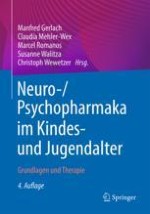Zusammenfassung
Die Zwangsstörungen zählen mit einer Prävalenz von 1–2 % zu den häufigsten Störungen im Kindes- und Jugendalter. Die Therapie orientiert sich am Schweregrad der Zwangsstörung und am Vorhandensein komorbider Störungen. Eine evidenzbasierte Therapie bei Kindern und Jugendlichen beinhaltet Elemente der Psychoedukation, der kognitiv-verhaltenstherapeutischen Psychotherapie (KVT) und einer pharmakologischen Behandlung. Die KVT und ihre Bausteine Exposition und Reaktionsverhinderung sind besonders wirksam. Je nach Alter der Patienten sollte die Familie in die Therapie einbezogen werden. Auch selektive Serotonin-Wiederaufnahmehemmer (SSRIs) zeigen sich in verschiedenen Metaanalysen, die randomisiert-placebokontrollierte Studien an Kindern und Jugendlichen eingeschlossen hatten, als sehr wirksam und sind Wirkstoffe der ersten Wahl. Um eine ausreichende Wirkung zu erzielen, bedarf es bei der Behandlung von Zwangsstörungen in der Regel mehr Zeit und oft höherer Dosen als bei anderen Indikationen. Die Kombination von KVT und einer Medikation zeigt nicht immer eine Überlegenheit, hat sich aber bei besonders schwierigen Konstellationen, z. B. bei komorbiden Depressionen, bewährt. Wirkstoff der zweiten Wahl ist das trizyklische Antidepressivum Clomipramin. Zugelassen in den meisten europäischen Ländern und in den USA für die Behandlung bei Kindern und Jugendlichen mit Zwängen sind Sertralin und Fluvoxamin. Fluoxetin hat zwar keine explizite Zulassung für Zwangsstörungen, aufgrund der positiven Studienlage nimmt die Bedeutung jedoch zu. Zur Augmentation mit Antipsychotika ist die Studienlage im Kindes- und Jugendalter gering.











